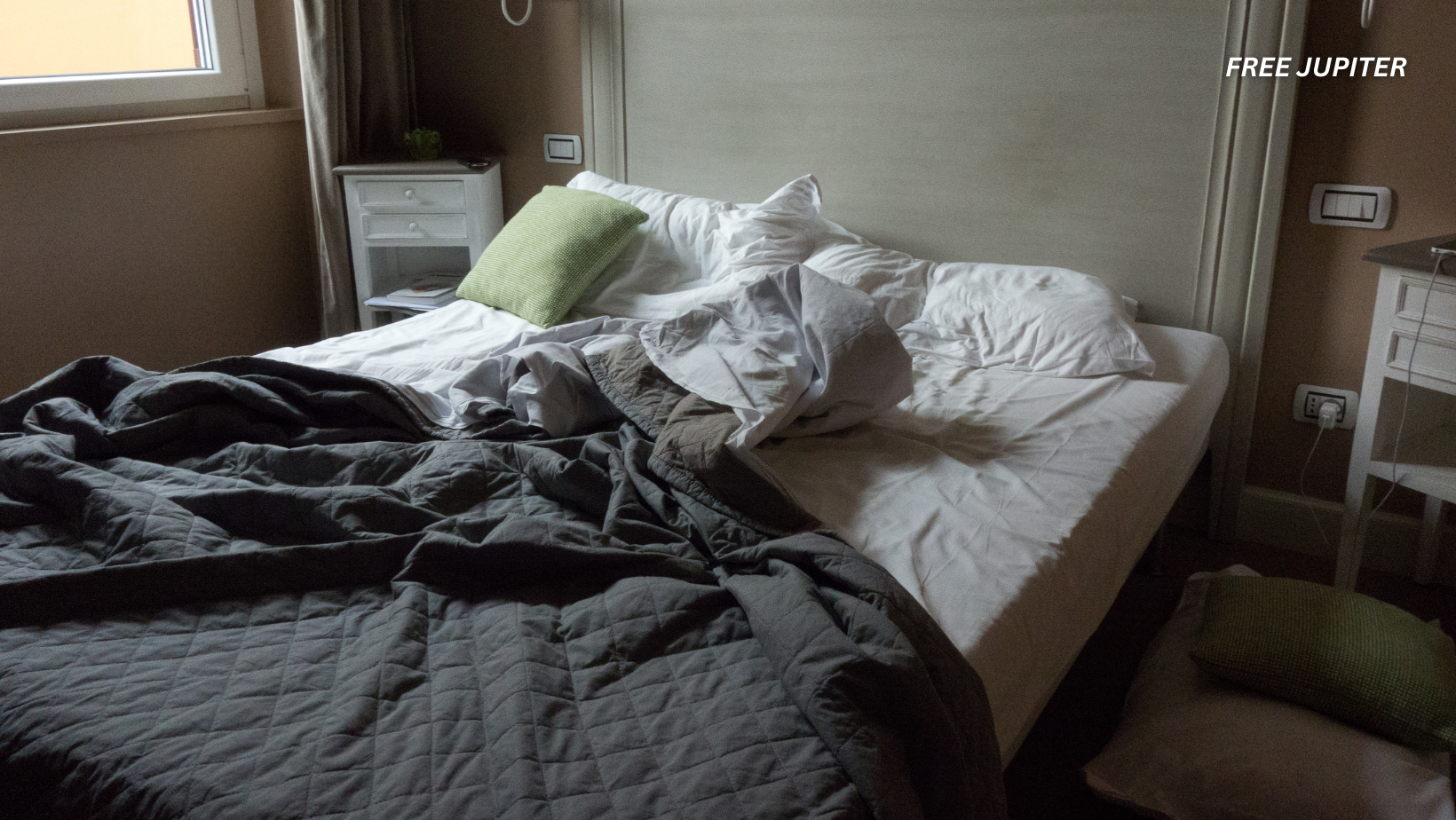For some people, the thought of making the bed right after waking up feels unnecessary—especially when mornings already demand energy for far more urgent things like getting ready for work, preparing breakfast, or catching the early commute. To others, it’s an important ritual—a small act that sets the tone for a productive day.
According to psychologist Leticia Martín Enjuto, this seemingly trivial choice—whether you neatly fold the sheets or leave them rumpled—can actually reveal a lot about your personality, mindset, and emotional patterns. She believes that “behind every simple act lies a story.” Something as ordinary as not making your bed may carry psychological meanings linked to how you view structure, control, and self-expression.
Enjuto emphasizes that these insights are not meant to label or judge. Instead, they aim to help people understand their habits in a deeper and more compassionate way. “We’re not robots,” she explains. “Our routines, or lack thereof, often mirror our emotions, motivations, and even our sense of identity.”
So what does it mean if you regularly skip the bed-making ritual? Psychologists have observed that people who do so often share certain characteristics—subtle but consistent tendencies that appear in how they live, think, and respond to the world around them. Here are eight personality traits commonly found among people who prefer to leave their beds unmade.
1. Prone to Procrastination
It often starts with a promise: “Tomorrow, I’ll start making my bed again.” Yet somehow, the next morning comes and goes, and the bed remains untouched. Psychologist Leticia Martín Enjuto says this is a familiar story.
People who regularly avoid small chores like this may have a deeper tendency to delay or avoid tasks, especially ones that don’t bring immediate satisfaction. This is known as procrastination, and it’s not necessarily about laziness—it’s often a coping mechanism for dealing with stress, boredom, or perfectionism.
Leaving the bed unmade might represent a mental “pause” from the pressures of routine. In some cases, it reflects how a person manages their energy throughout the day. Procrastinators often feel overwhelmed by big goals, so breaking them into smaller steps can help. For example, rather than saying “I’ll clean the whole house,” try “I’ll fix the sheets first.” The same technique applies to studying, exercising, or completing long-term projects.
Read more: 8 Signs That Two Souls Are Connected, No Matter The Distance
2. Living With a Flexible Routine
Those who make their beds without fail every morning often enjoy structure. Their routine gives them a sense of order and predictability—a way to feel in control before the day begins.
In contrast, people who skip this step may prefer a lifestyle that flows with the day’s rhythm rather than one dictated by strict routines. They’re comfortable adapting when plans change, and they often work best in spontaneous environments.
Enjuto describes them as individuals who are “less rigid and more open to improvisation.” They may not need rituals to feel balanced. In fact, too much structure can make them feel confined. Their adaptability allows them to handle unexpected events with more ease, making them quick thinkers and problem-solvers in unpredictable situations.
3. Quietly Rebelling Against Social Norms
Not making the bed can also be a subtle act of rebellion—a quiet refusal to follow a rule that feels unnecessary. Many people grew up hearing that “a tidy room means a tidy mind,” but not everyone agrees.
For some, this simple decision becomes a way to resist social conditioning. They might reject the idea that self-worth or success depends on how orderly their space looks. This small defiance often traces back to childhood experiences where rules felt restrictive or arbitrary.
Enjuto explains, “Skipping bed-making can be a way of saying, ‘I decide what matters to me.’” It’s not about being rebellious for the sake of it—it’s about autonomy. These individuals value authenticity over appearances, preferring to live by their own principles rather than what’s considered proper or expected.
4. Seeking Control and Independence
A bedroom is often the most personal space in a home—a private retreat that reflects one’s state of mind. For some people, choosing whether to make the bed becomes a way to assert control in that space.
When life feels filled with outside expectations—deadlines, family duties, or social standards—the choice not to make the bed can feel empowering. It’s a small but meaningful act of saying, “I control this environment.”
According to Enjuto, “It’s an assertion of personal power, especially for those who feel controlled in other areas of life.” Interestingly, people who express independence through small acts like this often show strong leadership qualities elsewhere. They trust their instincts and prefer to make decisions that feel aligned with their own values rather than those imposed by others.
5. Naturally Creative
Many creative thinkers find comfort in a little chaos. The sight of an unmade bed might bother a perfectionist, but for an artist, writer, or designer, it might symbolize freedom and possibility.
Enjuto observes that “creative individuals often find inspiration in disorder.” A messy bed, scattered notebooks, or half-finished projects can all be part of what she calls organized chaos. This doesn’t mean they lack discipline—it means their mind thrives in flexible, open-ended environments.
Some studies even suggest that messy spaces can boost creative thinking by encouraging people to make new connections between ideas. For these individuals, the bed doesn’t have to be perfectly arranged for the mind to feel productive.
Read more: The Way You Drive Says More About You Than You Think, According to a Therapist
6. Struggling With Motivation or Low Energy
Of course, sometimes an unmade bed is more than just a personal choice—it can be a sign of emotional or physical exhaustion. When daily responsibilities feel overwhelming, even small tasks can become difficult to manage.
Enjuto notes that if this behavior extends beyond the bed—like skipping meals, losing interest in hobbies, or avoiding social contact—it might be a reflection of deeper issues such as stress, depression, or burnout.
In these cases, the goal isn’t to force productivity but to focus on self-care and gradual recovery. Simple actions like opening the curtains, sitting by natural light, or tidying one corner of the room can gently reintroduce structure and motivation without pressure.
7. Craving Personal Freedom
Freedom is a powerful motivator for many who resist daily chores. Making the bed may feel restrictive—a reminder of societal routines and expectations.
Enjuto explains that skipping the ritual can be a “symbolic declaration of independence.” These individuals want to live life on their own terms, free from arbitrary rules. They tend to value experience, authenticity, and creativity over rigid structure.
Interestingly, this same desire for freedom often translates into broader life choices. They may prefer flexible careers, travel opportunities, or unconventional lifestyles that allow them to express themselves without limits.
8. Comfortable With Imperfection
Lastly, those who leave their beds unmade often have a healthy relationship with imperfection. They don’t stress over minor flaws or unmet expectations. To them, life is meant to be lived, not constantly polished.
This attitude can be deeply liberating. Instead of striving for a spotless home or flawless routine, they prioritize comfort, authenticity, and presence. Their mindset says, “It doesn’t have to be perfect to be enough.”
Psychologists believe this acceptance reflects emotional maturity. People who are comfortable with imperfection often show higher resilience, better stress management, and a more relaxed outlook on life.
Read more: 14 Ways That Manipulators Will Test Your Boundaries
The Takeaway
Whether you tuck your sheets every morning or leave them tangled until bedtime, it’s less about cleanliness and more about what your habits say about you. Enjuto reminds us that “our daily rituals reflect our relationship with ourselves.”
Making your bed might make you feel organized and accomplished, while leaving it unmade might help you feel free and creative. There’s no right or wrong answer—it simply depends on what nurtures your sense of peace and authenticity.
So, the next time you walk past your unmade bed, remember—it’s not necessarily a bad habit. It might just be your personality, quietly expressing itself in the comfort of your own space.
Featured image: Freepik.
Friendly Note: FreeJupiter.com shares general information for curious minds. Please fact-check all claims and double-check health info with a qualified professional. 🌱










